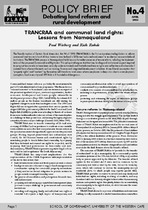| dc.contributor.author | Wisborg, Poul | |
| dc.contributor.author | Rohde, Rick | |
| dc.date.accessioned | 2019-02-21T11:02:04Z | |
| dc.date.available | 2019-02-21T11:02:04Z | |
| dc.date.issued | 2003 | |
| dc.identifier.citation | Wisborg, P. (2003). TRANCRAA and communal land rights: Lessons from Namaqualand. Policy Brief 4, Bellville: Institute for Poverty, Land and Agrarian Studies, University of the Western Cape | en_US |
| dc.identifier.uri | http://hdl.handle.net/10566/4244 | |
| dc.description.abstract | The Transformation of Certain Rural Areas Act, Act 94 of 1998 (TRANCRAA) is the first comprehensive legislation to reform
communal land tenure in South Africa. It aims to transfer land in 23 former coloured rural areas to residents or accountable local
institutions. The TRANCRAA process in Namaqualand holds lessons for wider processes of tenure reform, including the implementation
of the proposed Communal Land Rights Act. This policy brief argues that the time, funding and institutional support required
to carry out tenure reform have been seriously under-estimated, and that reformed tenure rights are ineffective and vulnerable if
isolated from other entitlements such as training, finance and integrated development initiatives. A neo-liberal assumption that
property rights and markets by themselves will transform rural areas where people are in deep crisis due to unemployment,
corruption, food insecurity and HIV/Aids is ill-founded and dangerous. | en_US |
| dc.language.iso | en | en_US |
| dc.publisher | Institute for Poverty, Land and Agrarian Studies, University of the Western Cape | en_US |
| dc.relation.ispartofseries | Policy Brief: Debating land reform and rural development;4 | |
| dc.subject | Land reform programme | en_US |
| dc.subject | Communal land | en_US |
| dc.subject | Namaqualand | en_US |
| dc.subject | Communal land | en_US |
| dc.subject | TRANCRAA | en_US |
| dc.title | TRANCRAA and communal land rights: Lessons from Namaqualand | en_US |
| dc.type | Other | en_US |

